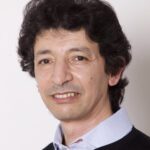Journal of Audiological MedicineVolume 6, Issue 3, 1997, Pages 170-184
Usher syndrome (USH) is an autosomal recessive defect associated with deafness, vestibular dysfunction and progressive retinitis pigmentosa leading to blindness. This syndrome is the most frequent cause of hereditary deaf- blindness in humans and is clinically and genetically heterogeneous. Three clinical subtypes (USH1, USH2, USH3) have been described and evidence for a minimum of nine different USH loci has been provided so far- i.e. at least six loci for USH1, two loci for USH2 and one locus for USH3. Presently, only the gene responsible for one of the genetic forms of this syndrome, USH1B (which seems to account for half of all USH cases) has been identified. This gene encodes an unconventional myosin – myosin VIIA. Current hypotheses on the function of myosin VIIA, and implication for the pathogeny of USH1B syndrome are discussed.

